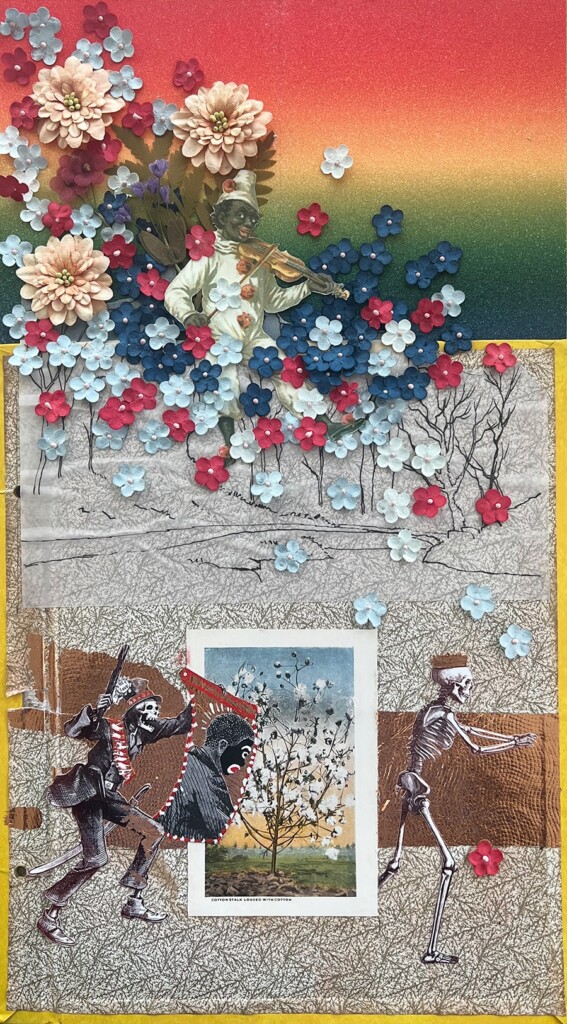
September 9 through October 7, 2023
Opening Reception: Saturday, September 9, 6-9 pm
How do you reclaim history? Use the very means that spread the historical lies in the first place! In a new show at Bermudez Projects, South Central LA native Delano Dunn does just that for America’s fraught history of discrimination against Blacks.
In The Fiddle, Dunn’s debut Los Angeles solo show, the artist takes Black memorabilia, Afro-Americana, and blackface collectibles produced in the U.S. from the 1900s-1950s and, in over a dozen mixed media collages, upends the narrative.
“While that memorabilia came in many forms, from kitchenware to toys and to decor, this work primarily focuses on the pictorial representation of Blacks in postcards depicting glorified scenes of slave life – many of which included happy notes from one friend to another: ‘Thought you’d enjoy this lovely scene!’ – and advertisements for products using Blacks in the most egregious stereotypes and tropes,” says Dunn, who now lives and works in Chicago.
“Collage allows me to combine seemingly disparate imagery, colors, textures and patterns to bring historical images into a new context, one that may not even exist–a fantasy land where body parts repeat or are removed altogether, where scale distorts, where young Black girls now tower over another being,” says Dunn.
To add more texture, Dunn brought in the work of “the father of the American cartoon,” Thomas Nast, the prolific illustrator whose work was seen across America in newspapers and magazines in the second half of the 1800s. Nast created the Republican elephant and the modern image of Santa Claus, and helped create White America’s vision of itself.
Dunn says combining Black memorabilia with Nast’s imagery is meant to show a conflicted America with no clear line drawn as to the fate of Blacks in this country. Paired together, the postcards and the Nast illustrations provide a blueprint for the revisionism we see occurring now of the factual narrative of slavery in America. Within Dunn’s reworked Black Americana, the figures are sealed into their new world, seen only between the punctures of the tar-like shoe polish angrily scattered across the canvas. In this world, they now have the power to decide their own fate.
Collecting the Black Americana source material brought its own challenges. As he sourced these items, amassing a disturbing collection in his home, Dunn says he was repeatedly jarred by the way the sellers described them, calling slave scenes, for instance, “sweet, wonderful, lovely, adorable” … the same infantilizing language used to debase African-Americans from the start. “Many times, a bidding war ensued online, and I wondered who else was collecting these items, and why,” says Dunn.
Gallerist Julian Bermudez says, “I’ve been enthralled by Delano’s work for a few years now, and am delighted to be able to bring him and his work to Los Angeles, and to give his message the attention it deserves.”
Delano Dunn (American, b. 1978) earned his BFA from Pratt Institute (2001) and his MFA from the School of Visual Arts (2016). In 2017, he was nominated for the prestigious United States Artists Fellowship and received the Sustainable Arts Foundation Individual Artist’s Grant. He was the 2016 recipient of the College Art Association’s Visual Arts Graduate Fellowship. Other awards include the Delaware Contemporary’s Curator’s Choice Award, and SVA’s Edward Zutrau Memorial Award and Alumni Thesis Scholarship Award. Residencies include The Wassaic Summer Artist Residency, Project for Empty Space in Newark, NJ, and SPACE at Ryder Farm. Dunn has been featured in The New York Times, VICE Media’s The Creators Project, and Hyperallergic, amongst others. He lives in Chicago with his wife and two children.
